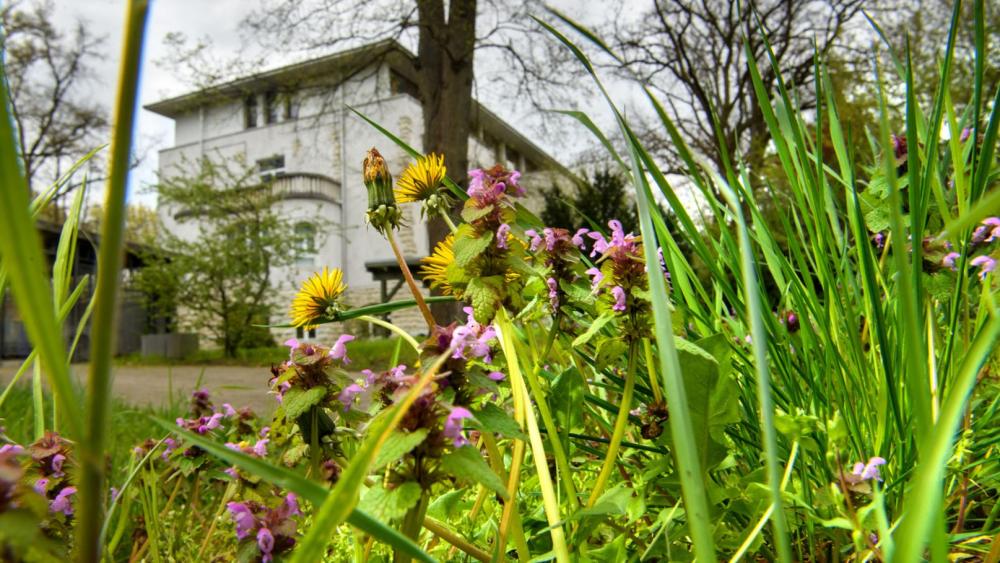
Photo: David Ausserhofer/IGB
We cannot preach water and drink wine! Consequently, several teams at IGB have begun to analyse and address the different opportunities for savings and improvements in their areas of activity.
Greener labs
IGB’s Technical Team, responsible for tasks such as building, facilities and utilities management, started to convert our cooling, heating and ventilation systems with a view to saving energy. Cooling chambers for sample storage were installed that consume less energy than individual cooling units and that release the waste heat to the ambient atmosphere instead of to temperature-controlled labs. The IGB Sustainability Initiative is also keen to test whether samples can be stored at a temperature 10 degrees Celsius warmer than usual, meaning -70 degrees, without sacrificing quality – which would save up to 30 per cent in electricity consumption. We use raw water instead of drinking water for fish keeping, reducing the energy required for additional treatment stages.
Greener construction
Our new Biodiversity Science Building on the Berlin-Dahlem Research Campus is still under construction. But once it is finished, it will not only serve environmental research, but will also comply with strict environmental standards. In order to achieve the highest quality rating of Gold under the Assessment System for Sustainable Building (BNB), the building must meet the principles of energy-optimised and sustainable construction. Among other things, the building will have sun protection with light control in front of the windows and a photovoltaic system on the roof, and will be constructed from durable yet recyclable building materials. It will embody sustainability, not only scientifically, but also architecturally – and will thus be one of the first gold standard research buildings in Germany.
Working in a green setting
Admittedly, our main sites at the lake Müggelsee and Lake Stechlin are beautiful places to work at. Two years ago, the Technical Team started to let the area “grow” around the buildings at Müggelsee. To aid the natural development of vegetation, the team switched from blanket irrigation to targeted irrigation, and created deadwood areas and compost heaps. The meadows are also mown less frequently, enabling them to grow during the flowering phase and provide a habitat for insects. For next year, an amphibian pond is planned: the pond, surrounded by native plant species, will help attract native amphibians.
Greener rides
One of the downsides of working in a beautiful setting is the need to commute long distances to work. Still, the majority of staff have always chosen to use public transport and/or cycle to work. For the benefit of our cyclists, the bike racks at our sites have been extended and equipped with repair and pump stations. In addition, doctoral students at IGB have launched a monthly IGBike Repair Café, helping cyclists to carry out repairs. This year we are “cycling for a good climate” in the CITY CYCLING competition for the fourth time.
Although the last one and a half years have shown that not every project meeting warrants a business trip, the analogue exchange will increase again, also for us. And we also intend to continue our research trips to freshwater ecosystems throughout Germany, Europe and the rest of the world. This is why we are currently developing green guidelines for business trips. Besides defining what many colleagues already voluntarily practise – trains before planes – the guidelines will also make it easier to justify the “more expensive” train travel, to enable staff to be reimbursed for their BahnCard railcard, and to facilitate the use of emissions offsetting for unavoidable flights in the future. Two electric cars have also been added to our fleet for the purpose of shorter rides in the region. In addition, we have purchased two electric cargo bikes for transporting light loads. These bicycles are an excellent substitute for short car journeys, or even medium-distance trips, depending on the cyclist’s sporting ambitions.
We raise a toast to these measures with sparkling water from our tap water dispenser! After all, we need to keep a clear head for the sustainability challenges that lie ahead, despite being proud of the improvements already made.
The text is based on an article in the latest Verbundjournal by the Forschungsverbund. The action taken by other institutes shall provide us with further inspiration!


